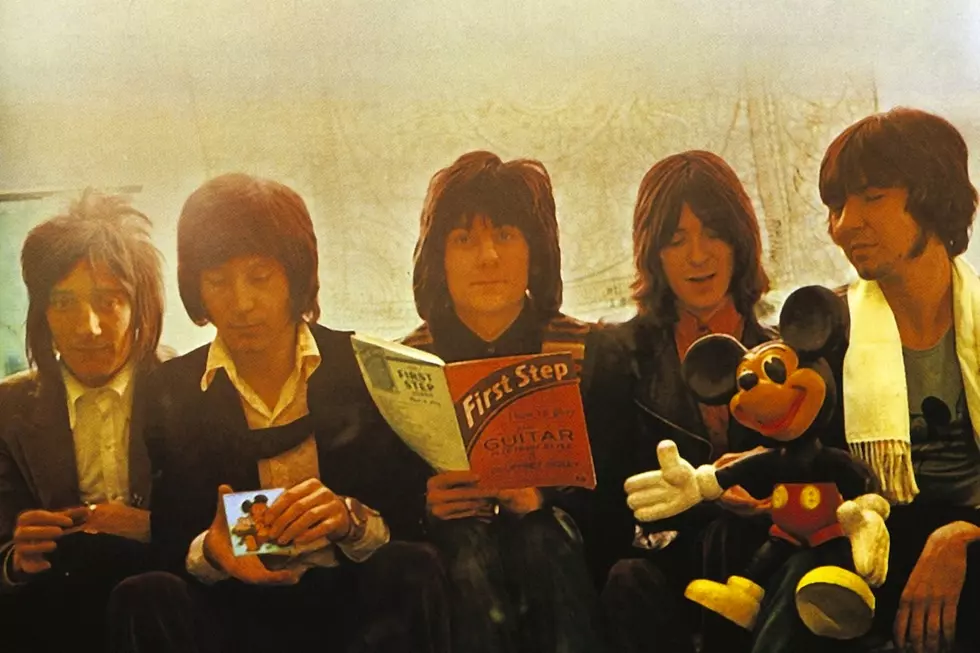
Why the Faces Showed Such Promise on ‘First Step’
They were a brand new band using an old name, pared down from Small Faces to simply the Faces. But U.S. editions of their debut album First Step from March 1970 still confusingly credited the old band.
The Small Faces former leader, Steve Marriott, had already left for Humble Pie, replaced by a rooster-haired young buck named Rod Stewart. Decades later, it's rather startling to think of Stewart and future Rolling Stones guitarist Ron Wood as the relatively unproven and unknown new Faces, compared to carryover Small Faces including bassist Ronnie Lane, organist Ian McLagan, and drummer Kenney Jones – but that's what they were.
Prior to fleshing out the Faces lineup, Rod the Mod and Wood had been lending a hand to the Jeff Beck Group after individually tracing long and winding paths across the '60s with numerous groups (Long John Baldry, the Artwoods, etc.). But both men had arguably yet to experience quite the same level of success as Lane, McLagan and Jones had with Marriott.
This intriguing band dynamic is rather apparent on First Step's cover band photo, where Wood is seen hiding behind a popular beginner's guitar tutorial book (also named First Step) with a deer-in-the-headlights look, and Rod sits to the left, meek as a mouse and almost pushed out of shot.
As for the music inside First Step, it too reflected the somewhat rushed and tentative collaboration of a band still coming to grips with each other's talents, strengths and weaknesses, and where to take their sound.
Listen to the Faces' 'Three Button Hand Me Down Shirt'
The Faces used a cover of Bob Dylan's "Wicked Messenger" to get them out of the gate, before testing their budding songwriting on Lane's almost hymnal "Devotional," his Dylan-esque lead vocal turn for "Stone," and the sub-Stones groove concocted by Wood and Lane for "Shake, Shudder, Shiver." Later on, both Wood's "Pineapple and the Monkey" and McLagan and Jones' "Looking Out the Window" were instrumentals (suggesting time in the studio had been short), though the first oddly showcased McLagan's organ skills and the second Wood's six-string mettle.
Far more impressive and among the scant bona fide career-spanning highlights to emerge from First Step were "Around the Plynth" (a slide guitar tour de force for Wood), "Nobody Knows" (a laid-back, folk-strummed jam, perfect for lazy Sunday mornings), and "Flying," which alternated from the soulful strains of Stewart and McLagan's vocal and organ, respectively, against recurring hard-rock punctuation courtesy of the Lane/Wood/Jones rhythm section.
Sure, the album's final and perhaps best-known song, "Three Button Hand Me Down," owed quite a lot to Goffin & King's oft-recorded "Some Kind of Wonderful," but the Faces' musical and personal charms would soon eclipse such small concerns.
What's more, the group's burgeoning musical chemistry would soon pay rich songwriting dividends on the twin towers of inspiration they would unleash in 1971, first with Long Player and then with A Nod Is as Good as a Wink ... to a Blind Horse. Both albums would go down as stone cold classics of the era and establish the Faces as one of history's most lovable bands.
Bands That Reunited Without Their Lead Singer
Rod Stewart's Spouse is One of Rock's Hottest Wives
More From Ultimate Classic Rock









